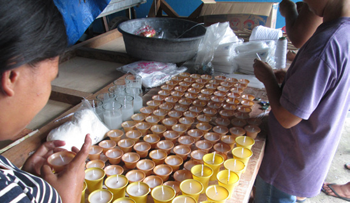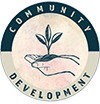ABM Archive Website
THIS WEBSITE CONTAINS ARCHIVE MATERIALS FOR HISTORICAL REFERENCE ONLY
For up-to-date information, including our latest appeals, news, and resources, please visit our current website.
Philippines: Community Capacity Building
 |
| Candle making in Talisay City, Cebu. © Lina Magallanes/ABM, 2015. |
 |
This is part of the Community Development Program: Learn more about ABM’s Programs here
ABM supports asset based community development in communities in the Philippines. Your support of this project will help people like Mercy.
“I am Mercy Bartolome, 45 years old, and a member of the projects committee of the BAKAS ABCD project organization in Daculan, Estancia, Iloilo. BAKAS has 27 members (19 female and 8 male) and was formed in November 2014.
Fishing is the main source of income of the community where I come from and livestock-raising is the secondary livelihood. Due to the decreasing fish supply and the unpredictable weather condition, many of the people in our barangay are forced to find odd jobs in order to sustain the family’s needs.
Before, I had no interest in getting involved with the concerns of our community. Instead I stayed home to tend to my family. Every day, I tried to make ends-meet with the small daily income of my husband who is a fisherman. Many of our needs were not provided for because we prioritise food above anything else.
Last year, I was introduced to the concept of Asset-Based Community Development (ABCD). At first I was hesitant in getting involved but I realised that it was simply because the life I used to have is limited to the affairs of my own family.
I started to accept the process and began to understand the ABCD. I realised how relevant the program is to women like me who for the longest time remain at the shadows of their husbands.
When I became a member of BAKAS, I made sure to attend the trainings and seminars because I believed that I will learn many new things from attending such activities. Indeed, it helped me to discover my potentials and establish relations with the other members of the organisation.
When the ABCD concept was applied to our community, we came to a consensus of formulating and managing an asset-based project called organic hog-raising. This project was formulated since all of us know how to tend live stocks like pigs and there is available vegetation in our community that have not been utilised.
We prepared the pig pens, including the construction materials and labour as part of our local contribution to the project. The ‘Bayanihan system’ or free collective work in constructing the pens became an inspirational support towards realising the project. Our project is guided by a set of policies which all of us contributed to conceptualising.
Monthly meetings were helpful to us as a method to monitor whether our activities are on the right track according to the plan. We formed a project committee, composing mostly of women including me, which was very effective in monitoring and assessing our asset-based project. The data that we provide helps BAKAS to ensure that our organic hog-raising will continuously provide the members with economic opportunities.
After four months of tending, we were able to market 8 pigs. Each of the members was able to receive around $100 to $120AUD as net income. BAKAS was also able to receive an organisational share of 10% from the gross profit.
I felt very proud that I was able to contribute to my family needs out of my own efforts. I also felt proud of what I have become due to my involvement in the community’s development initiatives.
With these kind of development efforts, I am hopeful that we in BAKAS will continue our journey towards serving our community through the ABCD project. I am very thankful that other countries particularly Australia are helping our communities”.
PH001IF needs $40,000 in 2016 (tax-deductible)
| This project receives partial funding from the Australian Government. |
HOW TO DONATE
You can make an online donation to this project by selecting Philippines: Community Capacity Building from the full project list.
Alternatively, for donations by cheque/money order (made out to the Anglican Board of Mission – Australia), telephone or email, view contact details here. Please don’t forget to include the project name and/or code with your payment details.
Gifts to ABM will be applied to the support of project(s) selected. In the unlikely event of the project being oversubscribed or not proceeding to completion, donations will be applied to a similar project to the one(s) selected.
PROJECT UPDATE
February 2016 – South East Asia Program Coordinator Lina Magallanes gives an update on the barangay communities of Songcolan and Palay in Aklan Province where she can see lots of positive change happening. Read more.
The inspiring and thought provoking story of a community in the Philippines that sent back the money for their water project when they decided they could raise the money themselves. This video explores the concept of Asset Based Community Development, which emphasises the strengths and existing assets of communities rather than the needs.
< Back


